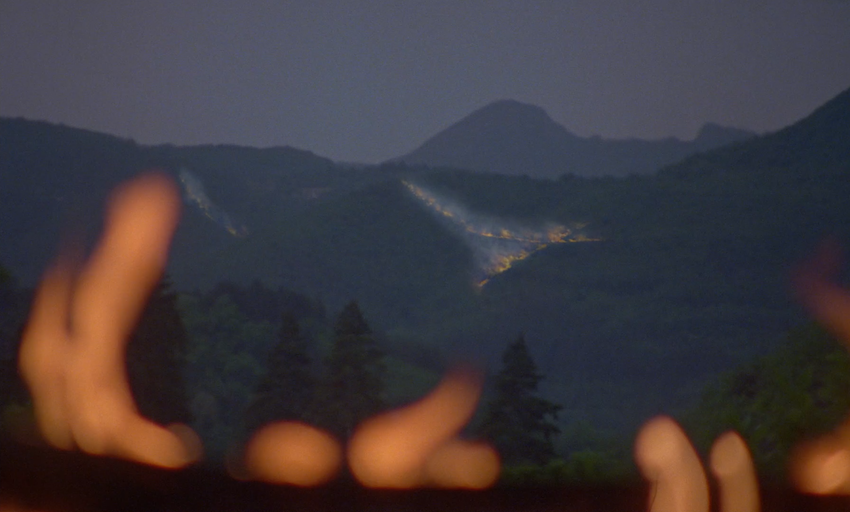LES SANGLIÈRES
SHE BOARS
film
68 minutes
2025
supported by CNC, Tënk & Mediapart, Occitanie and ARA regions, Mécènes du Sud, Art Situacions.
SHE BOARS
film
68 minutes
2025
supported by CNC, Tënk & Mediapart, Occitanie and ARA regions, Mécènes du Sud, Art Situacions.
preparatoy research supported by CNC DICRÉAM, CNAP aide au projet, MO.CO Panacée, CAC Chanot.
1525 : in a forest in the Cévennes in France, peasant women from many regions band together to fight the enclosure of common lands. A few centuries later, construction in the forest is under the watchful eye of Annie, a solitary 75-year-old night watchwoman. One night, the landscape is turned upside down.
festivals
Cinéma du Réel 2025, Fr international competition
IndieLisboa 2025, Pt international competition
DMZ docs 2025, Korea international frontier competition
International Film Festival of India, Goa experimental selection
Rencontres Cinématographiques des Belvédères, Fr
screenings
Fondation Pernod Ricard, Fr
Interspecies Conviviality, Spore Initiative Berlin, Germany
VHS au 6B, Saint-Denis, Fr
Carré d’Art musée d’art contemporain de Nîmes, Mois du Doc, Fr
University of Soongsil, Korea
Ecole des Hautes Etudes en Sciences Sociales, Fr
Research Center on the Commons, University of Jeju, Korea
Cinéma Nova, Brussels, Belgium
“What kinds of imaginary and historical resistance run through and link up the different temporalities of a region? In her first feature-length documentary, whose title is inspired by Monique Wittig’ Guérillères, Elsa Brès explores the tales and collective struggles that irrigate the Cévennes landscape, continuing a reflection begun in her installations and previous films. (...)
Devoid of dialogues and giving room for a sensory experience, the mise en scène centres on the lush vegetation and the bodies that live there, weaving a narrative where humans and animals join together to combat capitalism and patriarchy. By opening breaches in time, possible continuities take shape between the struggles of yesterday and those of today, inviting us to imagine other ways of inhabiting the world.”
Nepheli Gambade





Les Sanglières Annie Rodriguez, Diane Bonfils, Dayan Torres Gonzalez, Amandine Sellini, Silviana Gomes Mboge, Chloé Kulpinski, Cathy Wotjyna, Abel de Mai, Gaëlle Boucand, Judith Simon, Debora Levyh, Eva Courtès, Éole, Elsa Brès
team Victor Zébo, Thibault Solinhac, Sarah Blum, Iris Ibanez, Pauline Ogonowski, Hélios Fortin, Valentine Gelin, Ludivine Pelé, Eric Aurégan, Charlotte Buonomo, Gaëlle Boucand, Théophile Gay-Mazas, Colin Favre-Bulle, Maxence Ciekawy, Jennifer Fanjeaux, Jean-Do Scheer, Christiane Vervandier,
Sourdure, Nicolas Mollard, Méryll Ampe.
poster Korina Gallika
